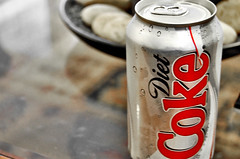I have been researching the effects of Aspartame for a couple weeks now and there is so much conflicting information that it's hard to come up with a definitive answer. So I thought I would provide some of the info that I found and let you form your own opinion on the discrepancy that aspartame is either harmful or helpful.
What is Aspartame?
Aspartame is a sugar substitute that is marketed under a number of trademark names, including Tropicana Slim, Equal, NutraSweet, and Canderel, and is an ingredient of approximately 6,000 consumer foods and beverages sold worldwide. It is commonly used in diet soft drinks, and is often provided as a table condiment. It is also used in some brands of chewable vitamin supplements and common in many sugar-free chewing gums. (http://en.wikipedia.org/wiki/Aspartame)
Those that support the use of Aspartame report the following:
- It was approved safe by the FDA in 1981
- Sugar substitutes do not cause cavities
- It helps you lose weight since one teaspoon of sugar contains 16 calories, whereas aspartame has less than 1 calorie per teaspoon
- To help control blood sugar, sugar substitutes reduce the total carbohydrate in meals and snacks and therefore can be a help in managing blood sugar levels.
- A study was performed where subjects were given doses of aspartame, some being 20 times the daily amount taken by the vast majority of the general population. The results were that these subjects showed no changes in mood, memory, behavior, electroencephalograms (which record the electrical signals of the brain) or physiology that could be tied to aspartame.
References - http://www.aboutaspartame.com/consumer/blog.asp
Those opposed to the use of apartame argue the following:
- It has been shown that aspartame in the dose accepted as safe by the FDA (50 mg/kg/day) can produce phenylalanine levels in a large number of women and their babies during pregnancy-large enough to produce abnormal development of the baby's brain.
- The manifestations of aspartame disease in young children include severe headache, convulsions, unexplained vision loss, rashes, asthma, gastrointestinal problems, obesity, marked weight loss, hypoglycemia, diabetes, addiction (probably largely due to the methyl alcohol), hyperthyroidism, and a host of neuropsychiatric features.
- It causes weight gain as a result from the liver working overtime to break down the chemicals in aspartame. Thus there is less energy available for fat burning and metabolism.
- It causes unstable blood sugar levels, which increases the appetite and causes cravings for sweets/sugar.
In my opinion...
I beleive that aspartame hasn't been around long enough for us to know the long term effects. However, I also think that "everything in moderation" is a good rule to stick too. If you have any advice or additional info on this subject, leave me your comments!

